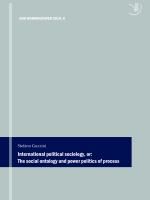New trends in international political sociology
Stefano Guzzini was invited by the editors Xavier Guillaume and Pinar Bilgin to provide one of the final overview chapters to synthesise the contributions to the forthcoming Routledge Handbook in International Political Sociology, here pre-published as DIIS Working Paper.
Guzzini reconstructs the origins of International Political Sociology (IPS) at the confluence of two earlier attempts to widen the theoretical inspirations in International relations. Insisting on the political constitution of many “forgotten” or eluded problématiques, colour or gender lines, post-colonial and post-structuralist approaches met International Political Economy scholars in their insistence on the stratified nature of international politics, with a shared emphasis on the role of knowledge (regimes of truth) therein, and the relentless boundary-producing practices in international affairs.
A first section shows how IPS mobilises a certain type of social theory for the analysis of international relations. Certain names frequently recur, like Pierre Bourdieu, Gilles Deleuze, Jacques Derrida, Mustafa Emirbayer, Michel Foucault, and Bruno Latour, not just because they are fancy for some (and reviled by others); they stand for something fundamental, namely an ontological commitment to see the social as constituted by practices, as relational, processual, assembled. These are ontologies which are wary of fixations and reifications, and see the world instead in terms of the processes through which things become the way they are, borders and identities are constituted, lines re–drawn.
A second section will develop the vision of politics which underlies these chapters. Stressing the re-drawing of boundaries and political issues in their becoming, IPS looks at where things could have been otherwise; and where processes are not innocent in their effects. Not all of these processes may be political in a strict sense or have political significance. But they could be. Hence, besides a certain ontological stance, there is an almost insatiable curiosity to explore politics. This does not refer to political processes in a narrow sense – i.e. connected to political mobilisation, decision-making and implementation – but to the potential politics that pertain to the way the fixtures of social reality are constituted. Indeed, sometimes it reads as if politics were defined by being those processes in the first place (at the level of action), and then also in making them visible through scholarly analysis (at the level of observation).
